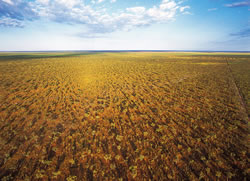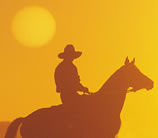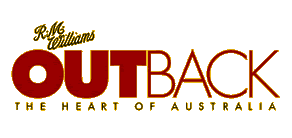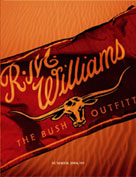OUTBACK STATIONS
 If
there's one aspect of the outback that fascinates people worldwide it's the
size and remoteness of cattle and sheep stations spread over the vast interior
of the continent.
If
there's one aspect of the outback that fascinates people worldwide it's the
size and remoteness of cattle and sheep stations spread over the vast interior
of the continent.
Often hundreds of kilometres from their nearest neighbor, these stations
are industries in their own right - running tens of thousands of livestock
and transporting immense quantities of produce all over the world.
You can visit some of these great stations in this selection of articles
from back issues of R.M. Williams OUTBACK
magazine.
Reconciling with the past
Issue 37 Oct/Nov 2004
A Merino sheep station in a spectacular setting on Bruny
Island is heralding better times ahead for indigenous Tasmanians.
Pure
Egelabra
Issue 36 Aug/Sept 2004
With more than 125 years of breeding, Egelabra
Merino stud has ensured its longevity with time-honoured traditions,
including a commitment
to training jackaroos.
Angus
family affair
Issue 35 June/July 2004
Cattle work and campdrafting are part of the fabric of life on central Queensland’s
Kimberley Station. Woven into the long days of station work for the Angus
family and their crew is the camaraderie of shared interests – particularly
a passion for beef and a love of horses.
A
pastoral vision
Issue 34 April/May 2004
Yarram Park has historical, cultural and pastoral significance for Australia.
It is also a beloved home for loyal employees, some of whom have retired
on the Victorian station after 40 years of service.
Classy
Collinsville
Issue 33, Feb-Mar 2004
Collinsville Merino stud in South Australia's Mid North has a long and proud
history of producing some of the finest sheep in the country. Despite a series
of ups and downs in recent years, the stud is looking to recapture its title
as the jewel in the industry's crown.
Life
on the track
Issue 32, Dec 03-Jan 04
The Birdsville Track is one of Australia's most famous roads, its history
steeped in the myths of the Kidman droving days, the Afghan cameleers and
the unstoppable mailman Tom Kruse. The families and characters that live
there today continue the legend. For the Kurtijar people of the Queensland
Gulf country, Delta Downs cattle station has always been home. Since its
purchase in 1982, it has also become a source of income, employment and pride
- plus a good source of bush tucker.
A
special kind of home
Issue 31, Oct-Nov 03
For the Kurtijar people of the Queensland Gulf country, Delta Downs cattle
station has always been home. Since its purchase in 1982, it has also become
a source of income, employment and pride - plus a good source of bush tucker.
Where
holistic is king
Issue 30, Aug - Sep 03
Sitting alongside George King as he eases his Cessna 182 into a low swoop
over the upland pastures of Coombing Park, one can't help but share his sense
of excitement at the changes he has wrought there in just five tumultuous
years.
Those
wily Colonial boys
Issue 29, Jun - Jul 03
Peter Edmonds finally has a grin on his sun-darkened face. After 18 months
of desperate drought, the channels and creeks of Keeroongooloo Station in
far western Queensland are full of water again
Quest
for quality
Issue 28, Apr - May 03
As harsh at it can be at times, the Monaro district of southern NSW has some
of the best sheep and cattle breeding country in eastern Australia, and is
home to many pioneering and long-standing grazing families. The Glasson family
has been on Jimenbuen for more than 60 years, in that time making it the
epitome of a productive, well-managed property.
Ranch
in the Rainforest
Issue 27, Feb - Mar 03
Recently enjoying fame as a location for several popular reality television
series, the idyllic El Rancho del Rey is better remembered as the site of
one of the tropical north's most successful pioneering cattle stations.
Chowilla's
many charms
Issue 26, Dec 02 - Jan 03
Jock and Lis Robertson reckon Chowilla Station in the South Australian Riverland
is the most beautiful property in the world. Their claim is backed by idyllic
waterways with 46 kilometres of frontage to the mighty Murray River and a
beautiful old sandstone homestead on its banks.
Life
on the hill
Issue 25, Oct - Nov 02
It doesn't take a genius to work out how Lawn Hill got its name. It's right
there as you approach the station from any direction - a rocky knoll, topped
by the main station buildings, rising out of the surrounding plains country
Deep
and meaningful
Issue 24, Aug - Sep 02
The Hayes family's success on Deep Well Station is like that of central Australia
itself. Committed to the same land that a predecessor settled in the 1880s,
the Hayes' longevity on Deep Well is a testament to their resourcefulness,
determination and an ability to work sympathetically with a harsh, but rewarding,
environment.
A
belief in beef
Issue 23, Jun - Jul 02
A Greek shipping magnate's conviction that Australian beef is the world's
best has prompted Gregory Hadjieleftheriadis to build a substantial organic
beef business based in the heart of cattle country in central Queensland.
Bold
new era for Haddon Rig
Issue 22, Apr - May 02
For well over a century the Falkiner family and Haddon Rig have been synonymous
with the very best Merino sheep. Even the 1990s wool recession couldn't shake
the Falkiners' faith in Merinos, although today their western NSW holding
is a vastly different operation than when, after a family dispute, F.B.S.
Falkiner settled the original holding.
Far
and away
Issue 21, Feb - Mar 02
Carnegie Station on the edge of the Gibson Desert is one of the most isolated
properties in Australia. Yet the owners, Ian and Faye Smith, are transforming
it a quality cattle property, while offering a welcome stop-off for travellers
along the Gunbarrel Highway.
21st
century pioneers
Issue 20, Dec 01 - Jan 02
There's no tougher place in the outback to make a living than on Cape York
Peninsula. Up there, if the wet season or the crocs don't get you, something
else probably will. The Bock family are typical of Cape station owners, who
are well and truly 21st century pioneers.
Family
stations
Issue 19, Oct - Nov 01
Whatever their size and scope of activities, family farms are the backbone
of Australian agriculture. Some family operations - like the McDonalds, a
Queensland cattle dynasty that runs 130,000 cattle on 11 stations - surpass
those of many corporate landholders. But as with most farming families, size
and wealth creation aren't the McDonalds' main motivations.
High,
wide and handsome
Issue 18, Aug - Sep 01
For decades Victoria's High Country has been renowned for its breeding cattle.
There, near the roof of Australia, sits Cobungra - a station with few peers
and whose new owners want it to be even better.
Grand
old Gostwyck
Issue 17, Jun - Jul 01
Standing in front of a small ivy-covered brick chapel, looking north along
a majestic avenue of 140-year-old elm trees, it is easy to agree with the On
The Wallaby columnist in The Pastoralist Review of December 15, 1906.
Bungaree's
brave new world
Issue 16, Apr - May 01
Sal Hawker sometimes feels trapped like a prisoner on beautiful Bungaree
station in South Australia's Clare Valley. Invariably, it is at busy times
when she doesn't leave the property, seemingly for months on end. Her life
providing a first-class tourism service becomes so all-consuming that she
even battles to know what is happening in the outside world.
The
Barkly's classy brunette
Issue 15, Feb - Mar 01
Brunette Downs is the Northern Territory's largest single pastoral lease,
and one of northern Australia's most progressive stations. The Santa Gertrudis
herd introduced 40 years ago by then US owner, King Ranch, still forms the
basis of a formidable stud and commercial herd. But what distinguishes Brunette
Downs is its lake country - and a new emphasis on staff training.
The
lucky country
Issue 14, Dec 00 - Jan 01
The Atkinsons of Greenvale, north Queensland have a classical family station
operation. Five generations have been involved on Lucky Downs and the now-expanded
2000sq km aggregation, and judging by the family's record and approach to
the cattle business, there'll be many more.
Saltbush
survivors
Issue 13, Oct - Nov 00
If low wool prices don't make life tough enough, environmental
problems that confront the McFarland family of Oxley Station would beat many
other landholders. But undaunted, and often using conventional methods, they
have found the formula for success in unforgiving country.
Home
of the wineglass brand
Issue 12, Aug - Sep 00
The watercourse that in 1861 explorer John Stuart named after the Secretary
of the Colonies, the Duke of Newcastle - describing it as "a
splendid reach of water" - is today the lifeblood of Newcastle Waters, one of northern Australia's great
cattle stations and the key cog in Kerry Packer's vast integrated pastoral
empire.
Yearning
for Yanga
Issue 11, Jun - Jul 00
Yanga Station in NSW's southern Riverina boasts many attributes - 200 km
of Murrumbidgee River frontage, a near original homestead, a wonderful history
and employees who rarely want to leave.
The
determined Dolbys
Issue 10, Apr - May 00
Mount Pierre is one of numerous Aboriginal owned and operated cattle stations
in northern Australia. With a strong commitment to make the station efficient
and profitable, manager Louie Dolby and his family are tackling their tasks
with relish - and some success.
Alexandria
Station:
Princess of the Barkly
Issue 9, Feb - Mar 00
For 123 years Alexandria Station has held a special place in the northern
Australian cattle industry.Although less than 60 percent of its original
size, the 16,000 square kilometre station is easily the Northern Territory's
largest. Owned by descendants of the original lessees who took up the station
- sight unseen - in 1877, the famous black soil downs carry more than 60,000
cattle.
Fossil
Downs
Issue 8, Dec 99 - Jan 00
At the end of the long drive flanked by stoic looking boab trees, the two
storey homestead surrounded by manicured lawns and tropical garden beds with
the Australian flag flying proudly overhead is almost surreal after kilometres
of dusty roads and dry Kimberley landscape.
Home
on the range
Issue 7, Oct - Nov 99
Tourism and the Rasheed family are familiar partners. Now Dean and Lizzie
Rasheed's Arkaba Station in South Australia's Flinders Ranges is set for
a unique eco-tourism venture.
Big
times on the Big Run
Issue 6, Aug - Sep 99
The Big Run - Victoria River Downs - is an icon and an enigma in the northern
cattle industry.
Kidman:
the jewel in the crown
Issue 1, Oct - Nov 98
When heavy storms swept across Durham Downs station in western Queensland
in late July, manager John Ferguson went on full alert. He ordered a helicopter
to check the station for stranded cattle and downed fences, and for his ringers,
who were caught in a stock camp.
The
Big Shed
Issue 1, Oct - Nov 98
The concrete and iron monolith on Reola Station is the Opera House of Australian
shearing sheds.
Eidsvold:
Norway no more
Issue 2, Dec 98 - Jan 99
The dark red rumps of the cattle glow through the golden clouds of Queensland
dust as they blunder around the yards in bewildered mobs, blinking and bellowing.
It's weaning time at Eidsvold Station and the afternoon air is filled with
a sad symphony of roars, whines, moans and wails, mixed with the whistling
and calling of the cattlemen.
Tom
Brinkworth's water world
Issue 4, Apr - May 99
One of the great, self-made men of the inland, Tom Brinkworth, has a different
vision of the interior of this continent from most people. He sees it not
as a dry, red heart, rather as a region of wetlands.
Pilbara
Pioneers
Issue 5, Jun - Jul 99
The Pilbara is gentle and serene in a good Wet, with spinifex waving like
wheat on the flats and the heady smell of fresh country. For Lang Coppin
of Yarrie Station this rainy season is a relief, for the cattle are fat and
sleek and the pressure is off.


